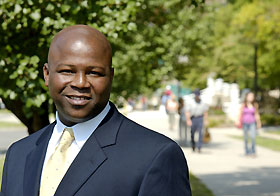For more archives, go to the Advance Archive/Search Page.
New Admissions Director Brings
Experience, Stage Presence To Job
Lee H. Melvin, a college admissions official with extensive public university experience, has been named the new director of admissions at UConn.
Melvin, who joins the University from Wayne State University, where he was associate director of admissions, started work at UConn on September 1. He also has worked at the universities of Wisconsin-Madison, Georgia, and Michigan, and Houston Baptist University.
 |
Lee Melvin, director of admissions, has extensive experience in public higher education. He says he also learned valuable skills from his early experiences working in a restaurant and training as an opera singer.
|
"I am excited to have Lee on board because he has a wealth of experience at comparable large public research universities," says M. Dolan Evanovich, vice president for enrollment management. "Lee will hit the ground running because of his experiences at peer institutions, and will help us continue our upward trajectory in what is a very competitive marketplace."
Melvin was attracted to the position because of UConn's success in recruiting high achieving freshmen. Since 1995, the University has, at the Storrs campus, enrolled 59 percent more freshmen, increased SAT scores by 63 points, enrolled more than 570 valedictorian s and salutatorians, and increased minority enrollment by 72 percent.
"I was attracted to UConn because of its excellent academic reputation around the country and internationally," Melvin said. "And as far as the admissions industry goes, UConn has had excellent success."
Originally from South Florida, Melvin earned a bachelor of music education degree from Houston Baptist University and a master of music degree from the University of Michigan in 1992. He originally planned to be a performer and has sung opera with the Baltimore Opera, Cincinnati Opera, and Chatauqua New York Opera Companies.
"Opera singing is still a love of mine, but in admissions you can have a long-term impact on someone's life," he says. "My advice to students is always to study what you love."
Melvin, whose favorite role is Rodolfo from La Bohème, says opera taught him many useful skills for admissions work. "I have learned how to think deeply about issues, how to step outside my comfort zone and take a risk, and, if I make a mistake, how to recover without letting it destroy me," he says. Having stage presence, he says, can also be useful when making professional presentations.
His 13 years of experience in admissions and financial aid have been focused on promoting college access, including awarding merit- and need-based financial aid, diversity and multiculturalism, and integrating technology into the admissions process. His experiences as the coordinator of minority recruitment programs at the University of Georgia, and as a financial aid officer at the University of Michigan, have made him an advocate for change in today's multicultural recruiting environment, he says.
Melvin also served in the University of Michigan admissions office, as assistant director of admissions at Wisconsin, and as associate director of admissions at Wayne State. But, he notes, he also learned from his experience as a restaurant manager in
Ann Arbor early in his career. That taught him the outlines of customer service and the value of having the "back room" - the kitchen in a restaurant or the applicant processing area in admissions - function smoothly, he says.
"When you run a restaurant, you are very attentive to the immediate customer. You try to anticipate customers' needs and work to meet them. This is the same thing we do in admissions," Melvin says. "We try to anticipate the needs of our prospective students, and design programs to recruit them and prepare them to come here."
Even when a student is not selected for admission, he believes that it is wise not to completely close the door.
"Sometimes you can't admit a student. But it's important to take the student's feelings into consideration and provide some recommendations about alternate routes they can take," he says. "It's possible that you may want that student to look at UConn as a transfer or graduate student later."
Melvin is active in a number of professional organizations and is on the board of the Videmus Inc., an organization that promotes the recordings of African American and women composers and performers.

